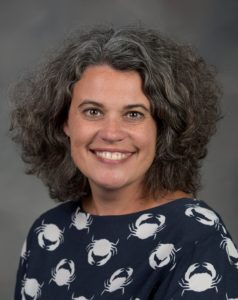 Professor Paula Patch is the College Writing/English 110 program coordinator, a senior lecturer in the English major and ENG 110 program and the newly elected Vice President of the Council of Writing Program Administrators, a national organization composed of writing teachers and writing program administrators. Additionally, Professor Patch recently co-authored an article based on the takeaways from teaching high school students: “What College Faculty Can Learn From Teaching High School Students,” with Professor Greg Hlavaty.
Professor Paula Patch is the College Writing/English 110 program coordinator, a senior lecturer in the English major and ENG 110 program and the newly elected Vice President of the Council of Writing Program Administrators, a national organization composed of writing teachers and writing program administrators. Additionally, Professor Patch recently co-authored an article based on the takeaways from teaching high school students: “What College Faculty Can Learn From Teaching High School Students,” with Professor Greg Hlavaty.
Professor Patch and Professor Hlavaty have been teaching Alamance County high school juniors for eight consecutive years for the College Writing for High School Juniors program, which is co-administered by the Elon University English Department and Collegiate Start @ Elon in the Office of Education Outreach in the Elon University School of Education.“We find that we really love teaching the class because there is something about the energy that high school students bring to a classroom that college students either hide or put elsewhere,” Professor Patch said, “You’re just getting like the real, raw person in a high school class.”
The first part of the class focuses on college essays and other materials for college admissions and the second half on college writing preparation, such as rhetorical skills, process skills and argumentation skills. “We want to give them a preview and some preliminary work into developing those rhetorical skills, process skills and argumentation skills that we know everybody can use constant, repeated practice with,” said Professor Patch, “It’s been fun because we’re teaching similar things [as English 110], but with different purposes.”
Professor Patch explained that teaching high school students also helps when creating English 110 curricula because “we know what [students] are coming in with.” She typically teaches two to three sections of English 110 per semester. “What I enjoy most is that I love first-year students and that transition time,” Professor Patch said. “I really like thinking about what that means in terms of that social and emotional aspect of that and how to make sure that students feel supported during that transition and thinking about those ways that they can use writing to help with that transition.”
Over 90 percent of Elon students take English 110, and Professor Patch is in charge of creating the English 110 curriculum, a responsibility which she does not take lightly. “I like knowing that the things that I do touch literally every student at Elon,” Professor Patch said, “I understand that I have a responsibility to every student at Elon. I like having that responsibility and knowing that when I make a decision I’m making it for every student at Elon, and that’s really cool.”
Professor Patch has theories on what makes the Elon English curriculum, or a curriculum in general, successful. “We all share a vision and a mission that are bigger than any individual instructor and are really bigger than the curriculum of the course. They’re bigger than any one class or one person,” Professor Patch said, “Because we have something bigger than ourselves and our individual classes to motivate us, we have a really strong community. When you go into the classroom, you take that kind of positive energy to work with students.”
On being both a writing program administrator and a writing teacher, Professor Patch said, “There’s a big difference and sometimes those things are at odds. You have to enforce standards while simultaneously being the person who has to conform to standards. I’ve learned that your personal values are always going to inform the program that you’re leading.”
Professor Patch is gaining even more leadership experience by taking on the role of Vice President of the Council of Writing Program Administrators, an all-volunteer organization. The Council of Writing Program Administrator’s leadership team is responsible for developing standards sometimes for the work that people do, hosting a conference and managing the organization’s journal. “The structure of the organization’s leadership team is such that you have a VP, a president and a past president,” Professor Patch said. “In two years I’ll be president, then in another two years I’ll be past president, so now that I’m starting off as Vice President it’s six years in a top tier of leadership in the organization.”
Additionally, Professor Patch is the first-ever non-tenure track professor to take on a leadership position in the organization. “It is important because non-tenure track positions are growing at a much faster pace,” Professor Patch said, “It’s really interesting because it’s an area that has lacked representation, even though it’s the largest growing area in the field. It’s really kind of an exciting time for me to be a leader and to represent that constituency.”
